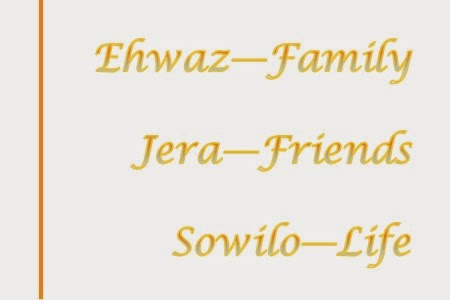 |
| Transitions create curves, inclines, bridges, and crossroads on our life paths |
No matter what kind of transition you're going through, it seems there should be a standard set of tools that will help you navigate those transitions and get you through the twists and turns, hills and valleys, and over those dreaded bridges. That was my line of thinking when I began my latest dialogue with the Runes.
Me: What tools do we need to help us through transitions?
Runes: Hagalaz, Raido, Perthro. Hagalaz serves to remind you that transitions are part of the ongoing process of life. When they begin, they upset the normal processes that have been in place, but going and getting through them is essential for growth. Raido reinforces life's journey. Life is a series of transitions of different duration and intensity. Perthro offers insight on two fronts to manage transitions. First, Perthro alludes to challenges, games of chance. These are key parts and the point of any transition. Transitions challenge you; transitions provide opportunities to take risks (games of chance). Second, transitions are easier when you have support. Perthro speaks directly to support from friends, community. Don't do it alone if you don't have to...and chances are that you don't.
Me: This is very helpful. Can you offer more insight into each? Being aware of the tools is one thing, but how can we best use them?
Runes: For Hagalaz, you can find help with Othala, Ansuz, and Thurisaz. When you face the hail Rune, it is important to remember Othala, for it is fluidity in time. It represents not only your heritage, but your current family and your legacy. When these two Runes face off, a lot is determined. Othala informs how you approach the transition and what you gain or lose by going through it. Ansuz is simple. Throughout the transition, communication is vital. You will gain and use knowledge, and learn lessons. Growth. Thurisaz is strength, the power you need to get through. Call it drive or determination. Your intention is to not only survive the transition, but thrive.
Me: That is a lot more depth into how to manage the onset of and get through the transition. What about Raido?
Runes: Raido is more about navigating when you are in the throes of the transition. This is when you can use Ehwaz, Laguz, and Gebo. In this instance, the aspect of Ehwaz that is used is loyalty. Loyalty is a foundation and, loyalty here is to the intent of the journey. It means staying true to successfully completing this phase of the journey. Laguz is another Rune that has two parts that oppose each other, but that are equally important. You have to know when to relax and go with the flow and when to go into the depths to gain greater understanding, because sometimes its a push and sometimes you just have to ride portions out. That can be hard, but Gebo's gifts can come from unexpected places. A challenge successfully met is a gift. The underlying message in Gebo is to look for the positive and build on that.
Me: That is important guidance for managing the twists and turns and even the unexpected when going through a transition. And Perthro? What deeper information can you give us on that?
Runes: I give you Wunjo, Jera, and once again, Ehwaz. As always, the ultimate goal is joy - Wunjo. When you go through a transition, you do it either for the joy that awaits on the other side, essentially because going through the transition is going to make you happy, or because you hope to find joy somewhere along the way. In the case of the latter, sometimes the best first step is the perspective that Gebo offered with Raido. A challenge, which is part of Perthro, that is a real struggle usually turns out making us feel a lot better in the end. Jera is always a good Rune to have. It serves as a gentle reminder that everything is a process. How do we get to a bountiful harvest? Sometimes things are sunshine and butterflies and sometimes you have to spread a lot of manure (and not the deceitful bullshit kind, but rather the actual get your hands dirty, smell it in the air stink kind). Things aren't always going to be easy, but if you do what needs to be done for good or bad, and don't try to cut corners, it will be worth it. And, last is Ehwaz. In this position, we focus on partnership and relationship, even the teamwork aspect of Ehwaz and transitions. As much as you might think you're doing something alone, you don't live in a vacuum. What you do affects and impacts others in ways you may not realize, so when you're going around a particularly sharp bend or up an steep incline, remember, you are not or do not have to be alone. There is always someone there who will help.
Me: Thank you for this wonderful advice. Jera reminded me that sometimes transitions take longer than we expect, but we have many tools at our disposal to manage them. So, whether we are dealing with romance or trying to decide our next career move, we should take stock in those tools and utilize them as best as we can.

































